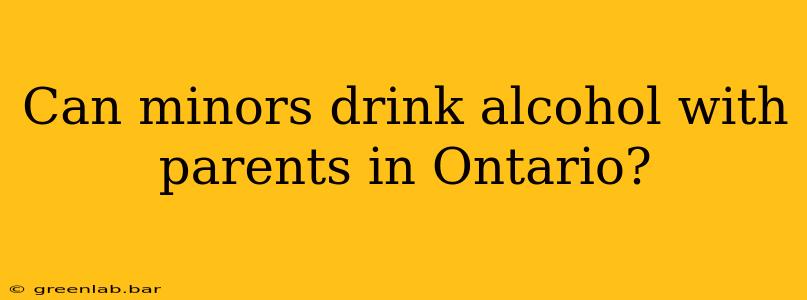The legal drinking age in Ontario, Canada, is 19 years old. This means that purchasing, possessing, or consuming alcohol is prohibited for anyone under the age of 19. However, the question of whether minors can drink alcohol with their parents in Ontario is more nuanced and requires careful consideration of the law and its interpretations.
While there's no specific law explicitly permitting minors to drink with parental consent in Ontario, the reality is more complex. The Alcohol and Gaming Commission of Ontario (AGCO) doesn't directly address this scenario in a simple yes or no answer. Their focus is primarily on preventing underage access to alcohol, not on the specifics of private consumption within a family setting.
The Grey Area: Private Consumption vs. Public Intoxication
The key distinction lies between private consumption within a controlled home environment and public intoxication. While providing alcohol to a minor is illegal, prosecution in cases of private consumption is rare. The AGCO's priorities generally lie in combating public intoxication, underage drinking in public places, and the illegal sale or provision of alcohol to minors.
What this means: Parents who allow their underage children to consume small amounts of alcohol in the privacy of their home are less likely to face legal consequences than those who facilitate public intoxication or provide alcohol at a public event. However, it's crucial to understand that this is not a blanket permission, and the situation is highly dependent on circumstances.
Factors Influencing Potential Consequences:
- Quantity consumed: A small amount of alcohol consumed at a family gathering is significantly different from supplying a large quantity or encouraging binge drinking.
- Frequency: Occasional, controlled consumption is viewed differently than regular or excessive alcohol use by a minor.
- Parental supervision: Strict parental supervision and responsible behaviour are crucial mitigating factors.
- Evidence of intoxication: If a minor becomes visibly intoxicated, the situation becomes considerably more serious and potentially subject to legal action.
- Reporting and complaints: Legal action is more likely if there are complaints from neighbors or if the situation is reported to authorities.
Responsible Parental Guidance: The Ethical Considerations
Even if the legal grey area provides some leeway, responsible parents should consider the significant health and developmental risks associated with underage drinking. Alcohol consumption can negatively impact brain development, increase the risk of alcohol dependence, and contribute to various health problems in young people.
Instead of considering whether it's legally permissible to allow a minor to drink, responsible parents should focus on:
- Delaying alcohol consumption: The longer a young person waits before consuming alcohol, the better their chances of developing a healthy relationship with alcohol (or avoiding it altogether).
- Open communication: Having frank and honest conversations about the risks and consequences of alcohol abuse is vital.
- Education: Providing accurate information about the effects of alcohol is crucial.
- Setting healthy boundaries: Establishing clear expectations and rules regarding alcohol consumption can help prevent problems.
- Seeking professional help: If a child or teenager struggles with alcohol abuse, it's essential to seek professional help.
Disclaimer: This information is intended for educational purposes only and does not constitute legal advice. The specifics of each situation vary, and it's always recommended to consult with a legal professional for advice on specific circumstances. The information provided is based on current understanding of Ontario law and may be subject to change. Always refer to official AGCO resources for the most up-to-date information.

